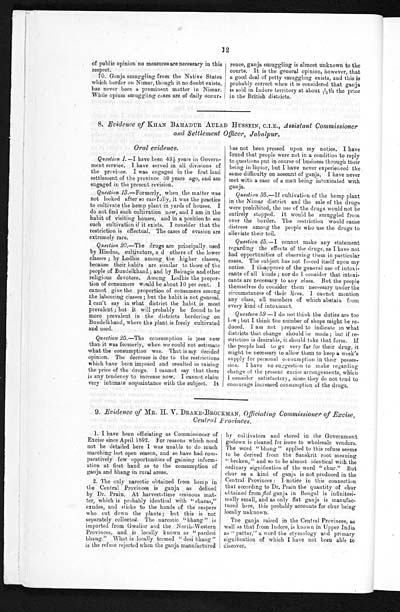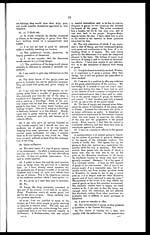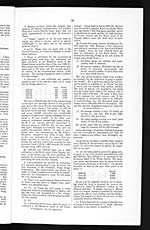Medicine - Drugs > Report of the Indian Hemp Drugs Commission, 1894-1895 > Volume VI > Evidence of Central Provinces witnesses
(30) Page 12
Download files
Individual page:
Thumbnail gallery: Grid view | List view

12
of public opinion no measures are necessary in this
respect.
70. Ganja smuggling from the Native States
which border on Nimar, though it no doubt exists,
has never been a prominent matter in Nimar.
While opium smuggling cases are of daily occur-
rence, ganja smuggling is almost unknown to the
courts. It is the general opinion, however, that
a good deal of petty smuggling exists, and this is
probably correct when it is considered that ganja
is sold in Indore territory at about 1/10 th the price
in the British districts.
8. Evidence of KHAN BAHADUR AULAD HUSSEIN, C.I.E., Assistant Commissioner
and Settlement Officer, Jabalpur.
Oral evidence.
Question 1. —I have been 49½ years in Govern-
ment service. I have served in all divisions of
the province. I was engaged in the first land
settlement of the province 30 years ago, and am
engaged in the present revision.
Question 13.—Formerly, when the matter was
not looked after so carefully, it was the practice
to cultivate the hemp plant in yards of houses. I
do not find such cultivation now, and I am in the
habit of visiting houses, and in a position to see
such cultivation if it exists. I consider that the
restriction is effectual. The cases of evasion are
extremely rare.
Question 20.—The drugs are principally used
by Hindus, cultivators, and others of the lower
classes; by Lodhis among the higher classes,
because their habits are similar to those of the
people of Bundelkhand; and by Bairagis and other
religious devotees. Among Lodhis the propor-
tion of consumers would be about 10 per cent. I
cannot give the proportion of consumers among
the labouring classes; but the habit is not general.
I can't say in what district the habit is most
prevalent; but it will probably be found to be
more prevalent in the districts bordering on
Bundelkhand, where the plant is freely cultivated
and used.
Question 25.—The consumption is less now
than it was formerly, when we could not estimate
what the consumption was. That is my decided
opinion. The decrease is due to the restrictions
which have been imposed and resulted in raising
the price of the drugs. 1 cannot say that there
is any tendency to increase now. I cannot claim
very intimate acquaintance with the subject. It
has not been pressed upon my notice. I have
found that people were not in a condition to reply
to questions put in course of business through their
being in liquor, but I have never experienced the
same difficulty on account of ganja. I have never
met with a case of a man being intoxicated with
ganja.
Question 35.—If cultivation of the hemp plant
in the Nimar district and the sale of the drugs
were prohibited, the use of the drugs would not be
entirely stopped. It would be smuggled from
over the border. The restriction would cause
distress among the people who use the drugs to
alleviate their toil.
Question 45.—I cannot make any statement
regarding the effects of the drugs, as I have not
had opportunities of observing them in particular
cases. The subject has not forced itself upon my
notice. I disapprove of the general use of intoxi-
cants of all kinds; nor do I consider that intoxi-
cants are necessary to any class. But the people
themselves do consider them necessary under the
circumstances of their lives. I cannot mention
any class, all members of which abstain from
every kind of intoxicant.
Question 59—I do not think the duties are too
low; but I think the number of shops might be re-
duced. I am not prepared to indicate in what
districts that change should be made; but if re-
striction is desirable, it should take that form. If
the people had to go very far for their drug, it
might be necessary to allow them to keep a week's
supply for personal consumption in their posses-
sion. I have no suggestion to make regarding
change of the present excise arrangements, which
I consider satisfactory, since they do not tend to
encourage increased consumption of the drugs.
9. Evidence of MR. H. V. DRAKE-BROCKMAN, Officiating Commissioner of Excise,
Central Provinces.
1. I have been officiating as Commissioner of
Excise since April 1892. For reasons which need
not be detailed here I was unable to do much
marching last open season, and so have had com-
paratively few opportunities of gaining inform-
ation at first hand as to the consumption of
ganja and bhang in rural areas.
2. The only narcotic obtained from hemp in
the Central Provinces is ganja as defined
by Dr. Prain. At harvest-time resinous mat-
ter, which is probably identical with "charas,"
exudes, and sticks to the hands of the reapers
who cut down the plants; but this is not
separately collected. The narcotic "bhang" is
imported from Gwalior and the North-Western
Provinces, and is locally known as "pardesi
bhang." What is locally termed "desi bhang"
is the refuse rejected when the ganja manufactured
by cultivators and stored in the Government
godown is cleaned for issue to wholesale vendors.
The word "bhang" applied to this refuse seems
to be derived from the Sanskrit root meaning
broken," and so to be almost identical with the
ordinary signification of the word "chur," But
chur as a kind of ganja is not produced in the
Central Provinces: I notice in this connection
that according to Dr. Prain the quantity of chur
obtained from flat ganja in Bengal is infinitesi-
mally small, and as only flat ganja is manufac-
tured here, this probably accounts for chur being
locally unknown.
The ganja raised in the Central Provinces, as
well as that from Indore, is known in Upper India
as "pattar," a word the etymology and primary
signification of which I have not been able to
discover.
Set display mode to: Large image | Zoom image | Transcription
Images and transcriptions on this page, including medium image downloads, may be used under the Creative Commons Attribution 4.0 International Licence unless otherwise stated. ![]()
| India Papers > Medicine - Drugs > Report of the Indian Hemp Drugs Commission, 1894-1895 > Volume VI > Evidence of Central Provinces witnesses > (30) Page 12 |
|---|
| Permanent URL | https://digital.nls.uk/74908857 |
|---|




